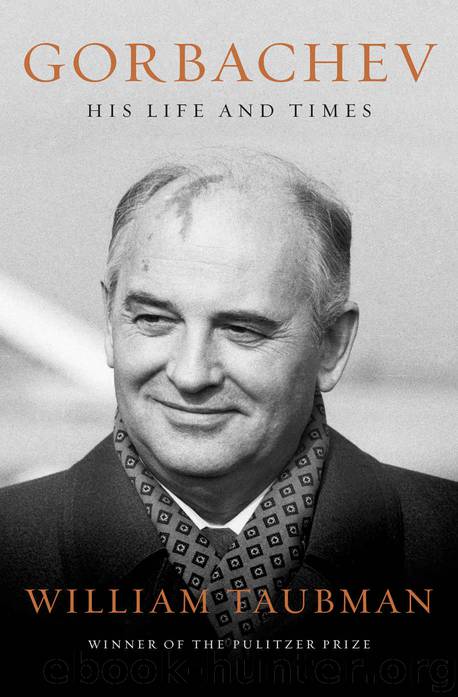Gorbachev: His Life and Times by William Taubman

Author:William Taubman [Taubman, William]
Language: eng
Format: azw3
Publisher: W. W. Norton & Company
Published: 2017-09-05T04:00:00+00:00
Gorbachev and Reagan strolling in Red Square, Moscow, May 31, 1988.
What Nancy Reagan wanted to say was “Thank you.” But it was hard to get a word in edgewise. As a result, when it turned out Mrs. Gromyko was to escort the first lady to Leningrad, that was quite fine with Mrs. Reagan. But she wasn’t pleased at the Gorbachevs’ suburban villa (to which they all repaired, along with the Shultzes and Shevardnadzes after a Bolshoi Ballet performance). When the Americans were tired and ready to leave, Mrs. Gorbachev jumped up, saying, “No, no, I want everyone to sit down. I have something to say”—kind things, Mrs. Reagan recalled, “but as usual she went on too long.”80
On the summit’s last day, Gorbachev held his first-ever Moscow press conference, televised live from the newly refurbished Foreign Ministry Press Center. After promising just a few words to the international press corps, he orated for almost an hour, mostly without notes, hailing the summit as “a huge international event,” but being careful to avoid “euphoria and excessive optimism.” To the Politburo four days later, he was less restrained: “Our prognosis was completely right.” The president proved himself “a realist.” “He was able to get in touch with the people.” The Soviet people were “very friendly to him.” The American people could see “our lives, the lives of regular Soviet people” on television. “Overall,” a “new turn” had taken place in Soviet-American relations. Ambassador Matlock agreed: Reagan’s personal praise for Gorbachev “probably did more than any other single event to build support in the Soviet Union for Gorbachev’s reforms.”
Much remained to be done, however. The strategic arms agreement, to which Gorbachev attached so much importance, remained as remote as ever. And Reagan’s term was in its last half year. The summit’s excitement couldn’t erase irritating domestic issues; in fact, Gorbachev’s press conference resurrected one of them. Yeltsin had held a press interview of his own during the summit, at which he called for Ligachev to be fired. When Gorbachev was asked about this at his news conference, Soviet officials on the dais went white. Reporter Don Oberdorfer “could almost see the wheels of [Gorbachev’s] brain turning” until “he went at Yeltsin with sudden ferocity,” condemning yet again the views Yeltsin had expressed in October 1987, warning that Yeltsin might be called before the Central Committee again to explain himself, dismissing the all-too-real problem of Ligachev: “The problem is simply nonexistent. That’s all.”81
Download
This site does not store any files on its server. We only index and link to content provided by other sites. Please contact the content providers to delete copyright contents if any and email us, we'll remove relevant links or contents immediately.
Fanny Burney by Claire Harman(26592)
Empire of the Sikhs by Patwant Singh(23069)
Out of India by Michael Foss(16845)
Leonardo da Vinci by Walter Isaacson(13310)
Small Great Things by Jodi Picoult(7114)
The Six Wives Of Henry VIII (WOMEN IN HISTORY) by Fraser Antonia(5495)
The Wind in My Hair by Masih Alinejad(5085)
A Higher Loyalty: Truth, Lies, and Leadership by James Comey(4947)
The Crown by Robert Lacey(4802)
The Lonely City by Olivia Laing(4796)
Millionaire: The Philanderer, Gambler, and Duelist Who Invented Modern Finance by Janet Gleeson(4461)
The Iron Duke by The Iron Duke(4348)
Papillon (English) by Henri Charrière(4255)
Sticky Fingers by Joe Hagan(4188)
Joan of Arc by Mary Gordon(4098)
Alive: The Story of the Andes Survivors by Piers Paul Read(4017)
Stalin by Stephen Kotkin(3956)
Aleister Crowley: The Biography by Tobias Churton(3628)
Ants Among Elephants by Sujatha Gidla(3459)
